In this article you will find out the skills leading law firms seek in their future trainees, ideas on making the working environment more diverse and how online learning works for law, thanks to contributions from LegalEdCon speakers, including HSBC, LexisNexis, Mayer Brown, BARBRI, ULaw, Oxford University, the City Law School amongst others!

On Thursday 14 May 2020, over a hundred organisations ranging from law firms, regulators and professional bodies, legal tech companies, universities and academic institutions to consultancies, media and charities attended LegalEdCon 2020 hosted by LegalCheek. It was the first-ever experience of virtually hosting this far-reaching event, but thanks to the LegalCheek team, Alex Aldridge and the sponsors (including The City Law School), everything went smoothly.
Throughout 6 sessions an impressive list of experts shared their thoughts on hot legal topics including diversity, inclusion and social mobility; embedding technology in legal education and training; the latest Solicitors Qualifying Exam (SQE) developments including the possibilities for delivering the training regime in virtual form; the new Bar Course training regime; and, finally, online learning. The speakers also made predictions as to how legal education and training can anticipate new forces within society.
It was a pleasure to see our City University teaching team represented by James Catchpole, Peter Hungerford-Welch and Dr Steven Truxal. Also, one of our distance learning students and legal apprentice Holly Moore (First Trailblazer Cohort) at ITV debated about how the SQE can be rolled out at a time of upheaval.
This article provides insights from the following sessions: “The Trainee of the 2020s”, “Diversity & Inclusion”, “Reimagining Online Learning Parts I, II” and the Closing Keynote, with an exclusive research finding update on Oxford University Professor Rebecca Williams’s project “Unlocking the Potential of Artificial Intelligence for English Law”.
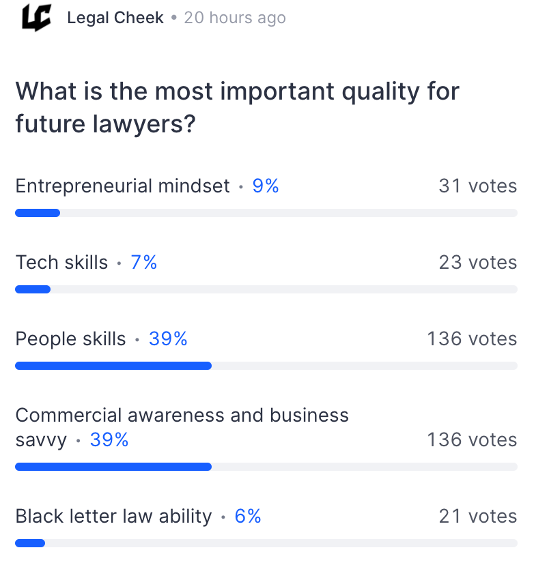
Audience poll results from LegalEdCon
Session 1 – The Trainee of the 2020s
Here are some of the key points from the first session:
- The most important skills for future lawyers are interpersonal and people skills (Chris Fowler, Group General Counsel for Technology and Transformation at BT)
- The starting point is that lawyers are well-rounded legal experts, but it doesn’t preclude lawyers from having expertise in other areas and have complementary skills (Richard Crabb, Head of Commercial Management at HSBC)
- Lawyers are those in whom the public places its trust. Junior lawyers and trainees should understand the role they play in society, their “public contract” and be willing to reshape legal skills to meet the demands of public (Matthew Hill, Chief Executive of the Legal Services Board)
“Law is still a human business at its core and building relationship is important”
According to Kate Gaskell, Director of Transformation at LexisNexis, if we are imagining the pyramid of a trainee’s essential skills, it will look as follows:

Legal knowledge always comes first and consists of black letter law, thorough legal research, being able to interview a client etc. Business knowledge and skills, as well as being able to show understanding of the clients’ business, comes second. Multidisciplinary workforce was rated third, leaving soft skills at the top. These ‘soft skills’ include possession of a resilient mindset, the ability to embrace curiosity and flexibility in approaching the clients’ case, being hardwired to carrying out problem-solving at speed, the ability to listen and empathise at the top of the pyramid.
Kate emphasised that a lawyer who is able to approach a client’s problem with curiosity and flexibility is highly valued as law is still a human business at its core and building relationships is important. You can find more on this in the LexisNexis ‘Future of Law’ blog.
Session 2 – Diversity & Inclusion
At the second session Tiernan Brady, Global Head of Inclusion at Clifford Chance, seemed to express the opinion of everyone present by saying: “Inclusion is a great goal but without the finish line, campaigning should be permanent. And if you are not campaigning for your values – they are not your values.” In other words, inclusion is something that firms have to constantly campaign for.
“If you are not campaigning for your values – they are not your values”
Julia Salasky, Founder and CEO of CrowdJustice and Legl designed her own innovative recruitment process to make it more diverse and minimise gender bias by attracting BAME applicants as well as those from backgrounds other than legal. Julia strongly believes that the more homogeneous is the company, the more similar people it attracts and, consequently, excludes others. She also mentioned an anonymous self-reporting opportunity which allows potential employees to feel comfortable while talking about their achievements to people with power.
Sally Davies, UK Managing Partner of Mayer Brown concluded the session by saying that employers need to listen and react without making assumptions about what people want. On the top of that, law firms should provide staff with a welcoming atmosphere and that senior management should always be accessible.
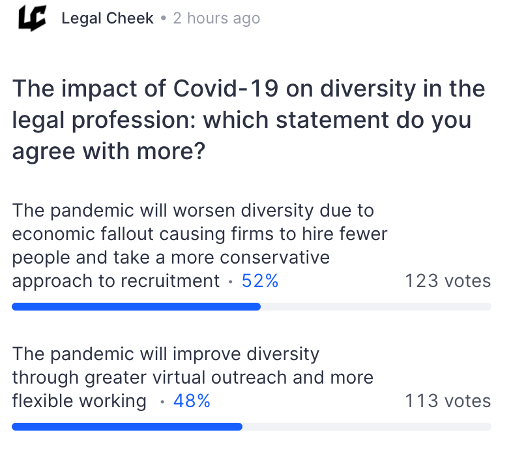
Audience poll results from “LegalEdCon
Session 3 & 5 – Re-imagining Online Learning Part I and II
One of the highlights of the third session was the speech of Sam Farkas, Vice President of Instruction and Online Education at BARBRI. He assured us of the effectiveness of online learning and called to shatter the perception that online education is secondary to face-to-face learning. Undoubtedly, poorly designed learning will not make online education effective, but carefully architected with the use of a structured systematic approach – will. Farkas explained that we shouldn’t judge online learning by how it is happening now.
Advice given to universities striving to render online education services included: design with the end in mind, create immersive instructional content, engage learners with a “lean-forward” learning experience, assess regularly and provide individualised feedback, as well as a customised learning path based on learner progress. Farkas wound up his speech by citing that an unexpected 77% of educators rated online learning to be the same as face-to-face one. We didn’t hear from which study these statistics originated however.
“We shouldn’t judge online learning by how it is happening now”
Peter Crisp, Pro Vice Chancellor External of ULaw, outlined four principles underpinning online learning: flexibility, technology, community and quality. He elaborated by speaking of the importance of developing socially immersive learning experiences, creating the sense of community and belonging, making the educational process student-centric and providing multimedia content with sufficient discourse opportunities. The speaker also made three predictions:
1. Legal learning will dramatically increase at post-graduate level;
2. There will be a massive shift to online assessment and invigilated exams. Assessments will run online, and people will be utterly confident about their integrity.
3. Face-to-face programs will remain the main choice, but there will be either much more integration in online learning or a start of blurring between online and in person learning.
The session certainly gave some food for thought, in particular because it did not quite sit well with what was said during the first session where the experts highlighted the importance of having interpersonal and human skills, multiple times. The controversial character of the online learning might have misled some participants, including Chrissie Wolfe, a solicitor from Birmingham office of Irwin Mitchell who paid attention in her Instagram to this inconsistency and highlighted that online learning thereby deprives educators of an environment where they traditionally develop those human and interpersonal skills.
The “Reimagining Online Learning Part II” session demonstrated that online teaching works hand in hand with cutting edge technologies and helps overcome international challenges. Jonathan Schwarz, Barrister at Temple Tax Chambers and Programme Director of the International Tax Law LLM at King’s College London Professional mentioned that online education is a great solution to those who have been always been struggling to manage professional responsibilities and deadlines.
“Students are prone to change their behaviour based on their success tracker”
Matthew Homewood, Head of Department at Nottingham Law School explained how Nottingham Law School use technology enhanced learning and revealed the technology which they use to keep track on student engagement. The core idea is to look at the algorithms behind student dashboards, which show the level of a student’s engagement and success. They can see how able a student is in relation to independent learning, compare peer-to-peer, get useful feedback on the assignments, track attendance and see library loans, as well as the current number of logged in students. They have found that the majority of students are prone to change their behaviour based on their success tracker. As to the lack of physical presence, it is of course topped up via personal contact with a personal tutor who support their student’s needs.
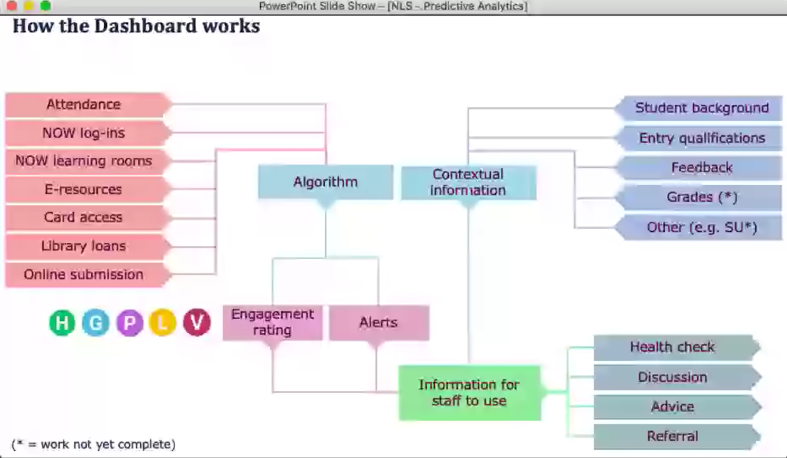
Dr Steven Truxal, Reader in Aviation Law and Associate Dean at The City Law School, described the University’s pioneering experience on creating an engaging virtual International Business Law LLM program launched 6 years ago and difficulties they encountered. Dr Truxal highlighted the importance of feedback from students and external lecturers that allows them to constantly improve education services, create new online programs and mindfully balance a traditional standard approach with an ambitious one. Participants were advised to think big, not to be restricted by asking what seems possible (though have a realistic plan), invest heavily into the online resources, train the staff to deliver quality services and share achievements in the online learning field. To better familiarise yourself with the program, take a look online.
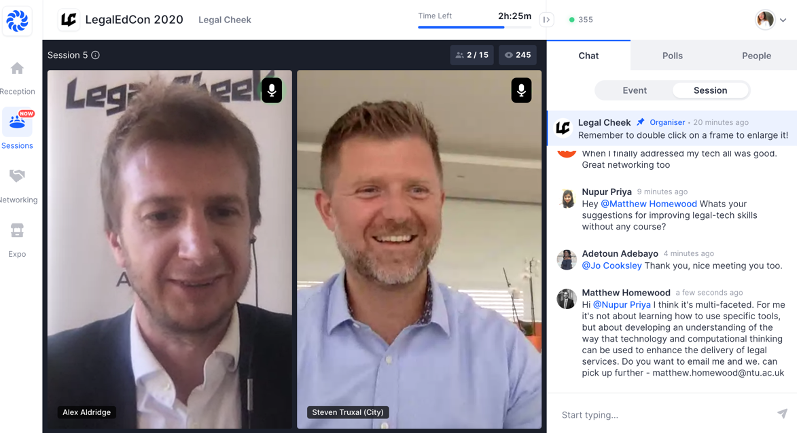
“In the future computer science degree may be a rival to a law degree for lawyers”
At the Closing Note, Oxford University Professor Rebecca Williams shared some thought-provoking research results, which revealed that:
- Although, core legal skills and knowledge will remain crucial, law and computer science should collaborate in developing emerging technologies. Moreover, it is highly important to boost data-oriented thinking, improve lawyers’ agile and design system, have greater commercial awareness and digital ethics’;
- AI’s implementation is an opportunity to improve legal services. In the future computer science degree may be a rival to a law degree for lawyers. That’s why lawyers should become “bilingual” in terms of being fluent in technologies;
- Lawyers should obtain a mindset understanding. So far, there has been some success of moving risk-averse mindsets towards a more growth mindset approach, which, as a research shows, leads to better performance over time.
To better familiarise yourself with the findings, see two recent papers from Professor Williams on which they were based: “What is the role of law schools in the 21st century?” and “Education for the provision of technologically enhanced legal services” both dated 2020. You can also see a shortened version of her Closing Note via the University of Oxford website.
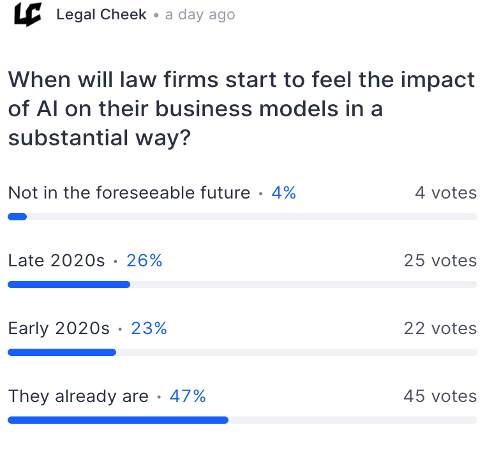
To wrap up, I would like to express my complete admiration for how quickly LegalCheek adapted to the current circumstances and the professionalism of the 9-hour Forum broadcasted live. Each speaker that was plugged in from home was listened to simultaneously by over 300 people. Apart from the legal-related part of the Conference, during the short breaks, delegates were able to network, do yoga or taste the recipes provided for the participants in advance. As was noticed by Sarah Hutchinson, Managing Director at BARBRI International, “One obvious and immediate benefit of the virtual conference format is that we can all benefit from experience across the World”.
Many thanks to Emily Allbon, Senior Lecturer in Law, Director of Mooting and lawbore founder for an opportunity to listen to the hottest legal topics firsthand!

Authored by Anna Dulina, an LLM student at City Law School with specialisation in International Commercial Law.
Anna is also a member of the Lawbore journalist team for 2019-20.

